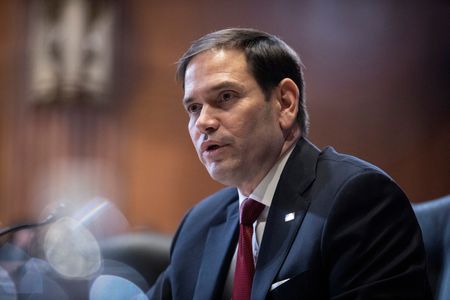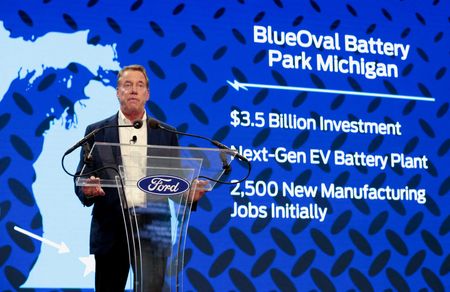By David Shepardson
WASHINGTON (Reuters) – Senator Marco Rubio on Tuesday asked the Biden administration to review Ford Motor’s deal to use technology from Chinese battery company CATL as part of the automaker’s plan to spend $3.5 billion to build a battery plant in Michigan.
Rubio, the top Republican on the Senate Intelligence Committee, wrote to Treasury Secretary Janet Yellen, Energy Secretary Jennifer Granholm and Transportation Secretary Pete Buttigieg calling for an immediate Committee on Foreign Investment in the United States (CFIUS) review of the licensing agreement between Ford and CATL.
Rubio said the deal “will only deepen U.S. reliance on the Chinese Communist Party for battery tech, and is likely designed to make the factory eligible for Inflation Reduction Act (IRA) tax credits,” in a statement posted on his website.
The $430 billion IRA imposes restrictions on battery sourcing and is designed to wean the United States off the Chinese supply chain for electric vehicles (EVs). The IRA will eventually bar credits if any EV battery components were manufactured by a “foreign entity of concern,” in a provision aimed at China.
CFIUS is a U.S. Treasury-led interagency panel that reviews proposed transactions to ensure they do not harm national security.
Treasury declined to comment, but Granholm said on Twitter on Monday that “bringing advanced manufacturing capabilities from overseas to the United States is key to our competitiveness, will stimulate our economy, and create good-paying American jobs.”
Ford said the plant would create 2,500 jobs and begin producing lower cost and faster recharging lithium-iron-phosphate batteries in 2026. It would own and control the facility with no foreign investment or U.S. tax dollars going to CATL, the automaker said in a statement.
Ford executive chairman Bill Ford said Monday that the technology agreement with CATL would “help us get up to speed so we can build these batteries ourselves – batteries made here in Michigan and built for America.”
Rubio said he wanted to ensure that no U.S. funds go to CATL “especially not when American F-22s are being deployed in real time to shoot down Chinese spy balloons.”
China says the balloon shot down on Feb. 4 was a civilian weather-monitoring aircraft, but the incident has deepened the diplomatic rift between the countries.
Republican House Majority Leader Steve Scalise tweeted criticism of the Ford deal, while Republican Virginia Governor Glenn Youngkin said last month that his state had withdrawn from the competition to attract the Ford plant over concern’s about China’s potential involvement.
(Reporting by David Shepardson; Editing by Jamie Freed)


